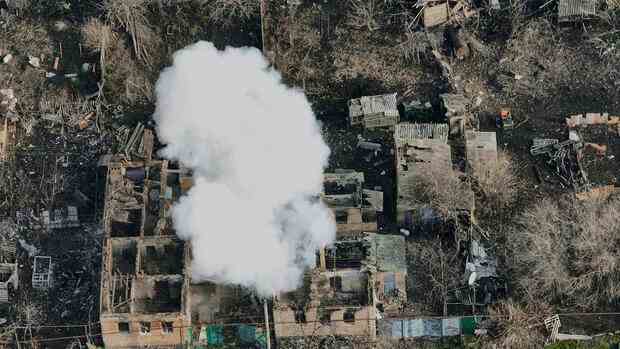Russia is still trying to gain control of Bakhmut. The Ukrainians are still fighting back.
(Photo: AP)
In the heated debates about arms deliveries, the accusation is often made that these would only prolong the war. Anyone who wants to negotiate should not send weapons. But the opposite is the case: in the best case, arms deliveries can even shorten the path to negotiations.
Ukraine wants to survive as a sovereign state: that is its goal in the defensive war against the Russian attack. She wants to make her own decisions about her future. From a Western European perspective, too, a sovereign Ukraine is the best guarantee of security in Europe. Incidentally, sovereignty, the inviolability of borders and the free choice of alliances are goals on which the Soviet Union, later Russia, and the western states had agreed as principles of the common house of Europe. Read about it in the CSCE Final Act 1975, the Charter of Paris 1990, the NATO-Russia Founding Act 1997.
It is therefore about negotiations that will enable a sovereign Ukraine to survive and pave the way to a lasting peace.
However, Russia has so far shown no interest in an end to the war that would leave sovereign Ukraine intact. Moscow offers negotiations on its own terms: its conquests should first be recognized as Russian territory and excluded from the negotiations. In addition to Crimea, this applies to the four annexed regions of Donetsk, Luhansk, Zaporizhia and Cherson.
Ukraine is to give up 15 percent of its territory (roughly the area of Portugal) including the population and cede it to Russia before negotiations even begin. But that would be a surrender, not a negotiation. Given the documented crimes under Russian occupation, from torture chambers to mass graves, in Izyum or Kherson, this is unacceptable for Kyiv.
Especially since the “land against peace” formula didn’t work as early as 2014: At that time, Ukraine had to accept that Russia annexed Crimea and occupied parts of the Donbass. A stable peace did not follow. The time since 2014 has been more of a breathing space for Moscow to prepare for the next step in 2022. And a confirmation that it can assert its interests with the law of the strongest.
“Apparently it’s not about annexing four territories and then living peacefully next to a sovereign Ukraine”
More importantly, there is nothing to indicate that Russia would settle for the four regions. According to official statements, Moscow still sees Ukraine’s statehood as a mistake and, in the tradition of 19th-century Russian imperialism, Ukraine as part of Russia.
Apparently it’s not about annexing four territories and then living peacefully next to a sovereign Ukraine. What matters to Moscow is that sovereign Ukraine ceases to exist. The situation in the occupied territories gives an impression of what a Russian victory could mean for Ukraine: the abandonment of Ukrainian culture and self-determination – from the destruction of churches to mass graves.
So how can negotiations begin? Discussions do take place, for example about prisoner exchanges – but not about the end of the war. How to persuade Russia to come to the negotiating table without preconditions when it appears that it has no interest in doing so? As correct as the demand for diplomatic approaches is, it has no answer to this question. So far, Moscow has not responded to requests to come to the negotiating table, to stop the war, or to withdraw from Ukraine. It still believes it can win the war, or at least prevent Ukraine from surviving.
In the best-case scenario, arms deliveries could allow Ukraine to change the military situation in such a way that Russia agrees to negotiations
A bad war, even a war of attrition, still seems better for Putin domestically than an end to the war that would reveal that he has failed in his goals. Without some kind of rethinking in Moscow, there will be no peace and stability in the region.
Therefore, the most promising option currently seems to be for Ukraine to put military pressure on Russia to agree to negotiations without preconditions. Consequently, arms deliveries and negotiations are not mutually exclusive. On the contrary: in the best-case scenario, arms deliveries could allow Ukraine to change the military situation in such a way that there is room for negotiation (instead of surrender), and thus shorten the war.
On the other hand, stopping support would mean pushing Kyiv towards capitulation, exposing the population to the Russian occupation and, in the worst case, prolonging the conflict, with incalculable consequences for stability and security in Western Europe as well. Yes, the war will end in negotiations, but the military balance of power at the end of the war will determine peace afterwards. And thus not only about the future of Ukraine, but also about security for all of us in Europe.
More: Why the chancellor in Latin America must defy Russian propaganda.
